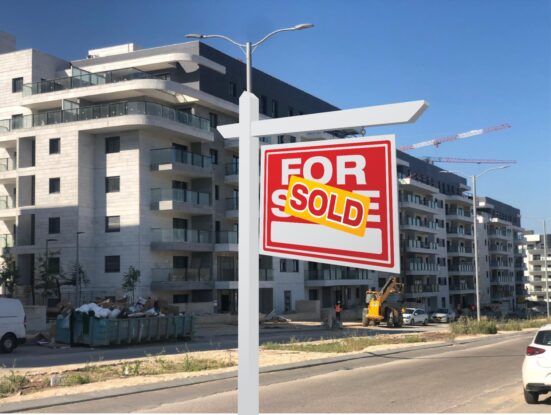As of June 1, 2025, Israeli homeowners upgrading to a new property now have 24 months—rather than 18—to sell their previous home and still qualify for the tax benefits associated with owning a single apartment (dira yechida), including reduced Purchase Tax and a full Capital Gains Tax exemption. This change replaces the temporary 18-month rule that expired on May 31, 2025. While a bill was proposed to make the shorter window permanent, it did not pass in time, and the law reverted to its original 24-month framework. The new timeline offers greater flexibility—particularly for buyers of new construction—but may be revisited by lawmakers in the future.
In an important development for Israeli homeowners upgrading their primary residence, the temporary 18-month period granted to “housing improvers” (meshaprei diur) to sell their previous home while retaining the beneficial tax status of a single home (dira yechida) has officially expired. As of June 1, 2025, this window has now been extended to 24 months and currently stands as the default under Israeli real estate tax law.
The temporary 18-month window was first introduced in 2023 to help buyers navigate delays in construction and economic uncertainty. A bill was proposed in 2024 to make the 18-month limit permanent, based on concerns about housing availability and affordability. However, it was not passed before the temporary order expired on May 31, 2025. As a result, the law automatically reverted to the original 24-month rule, now in effect for purchases made from June 1, 2025, onward.
This change aligns with the government’s broader policy goal to ease pressure on the housing market. By giving homeowners a longer window to sell, the Israel Tax Authority aims to support smoother transitions between homes—especially in cases involving construction delays—while still encouraging eventual turnover to increase available housing supply.
What is a “Housing Improver”?
A “housing improver” refers to an individual who owns a single residential property in Israel and chooses to sell it in favor of purchasing a new one—typically an upgrade in size, location, or quality. These individuals are eligible for reduced Purchase Tax (Mas Rechisha) and may also benefit from a Capital Gains Tax exemption (Mas Shevach) under the “single apartment” classification—commonly referred to as the replacement home tax benefit—so long as certain conditions are met.
The New Rule: 24 Months from June 1, 2025
Until now, according to Israeli Real Estate Taxation Law, housing improvers had 18 months from the date of purchasing a new apartment to sell their existing apartment and still qualify for the reduced purchase tax rates applied to a single apartment, rather than the higher rates imposed on owners of multiple homes, and the exemption from Capital Gains Tax on the sale of their old home, which applies only to a seller’s sole residence.
Starting June 1, 2025, the timeframe to sell the existing home after purchasing a replacement apartment has now been permanently extended to 24 months. In other words, if a homeowner purchases a replacement apartment on or after this date, they will have two full years to sell their original apartment and still be considered as owning only one property for tax purposes.
This means continued eligibility for:
- The lower purchase tax brackets for single-home owners
- The full Capital Gains Tax exemption on the sale of the original apartment
For those purchasing a new home from a developer—where construction and handover can take several years—the timeline for selling an existing home in order to qualify for the replacement home tax benefit is more flexible. Buyers may sell their original home within 24 months of the purchase date or 12 months from the date of Tofes 4 (Certificate of Occupancy) for a new apartment—whichever comes later.
Transactions Prior to June 1, 2025
However, it’s important to note that this 24-month window applies only to purchases made on or after June 1, 2025. If a replacement apartment was purchased before this date, the previous 18-month rule remains in effect. Homeowners in this category must sell their original property within 18 months to maintain dira yechida status and receive the related tax benefits for the replacement home. This distinction can significantly impact your tax obligations, so it’s important to confirm your exact deadline with a qualified professional.
Why the Rule Could Change Again
Critics of the 24-month extension argued that it allows wealthier homeowners to hold onto their previous homes for longer periods, reducing housing turnover and availability—especially in high-demand areas. Indeed, government data shows that households owning two apartments tend to have nearly double the average Israeli income. By shortening the ownership overlap period, policymakers had hoped to free up more homes for sale and make it easier for young couples and first-time buyers to enter the market.
What This Means for You
If you’re considering upgrading your home in Israel, this legal update gives you more breathing room to make the transition while preserving your status as a single-home owner in the eyes of the Tax Authority. The extended timeframe reduces the pressure to sell your current home quickly, allowing more time for thoughtful planning, market timing, or addressing construction delays. However, it’s still possible that the 18-month rule could return in the future, depending on how the Knesset proceeds. For those planning a move, it may be wise to act soon while the 24-month window is in effect.
At Buyitinisrael, we’re committed to keeping you updated on important legal and tax changes that affect English-speaking buyers and homeowners in Israel. Whether you’re buying your first home or upgrading to your next one, understanding the rules around the replacement home tax benefit can make a meaningful difference in your financial planning.
The Buyitinisrael Editorial team is made up of industry experts, journalists, researchers, editors, and translators working together to deliver reliable, up-to-date information about the Israeli property market — all in English. With a strong focus on transparency and accessibility, our goal is to empower English-speaking buyers by helping them understand the market and navigate the real estate process with clarity and confidence.
For inquiries, email info@buyitinisrael.com.



